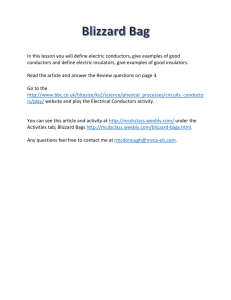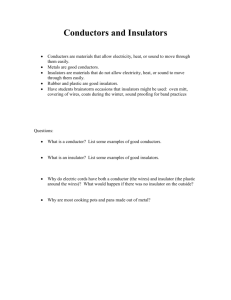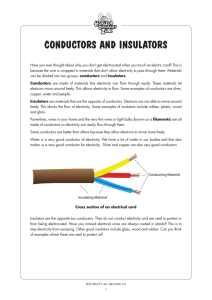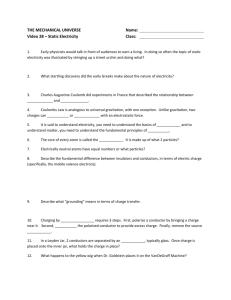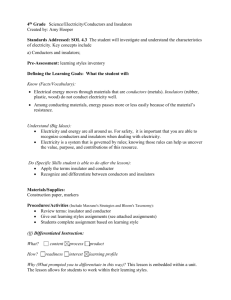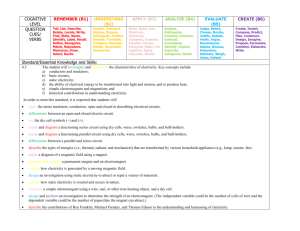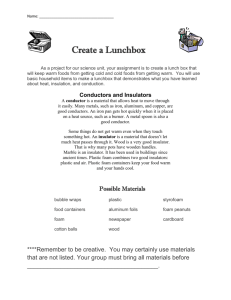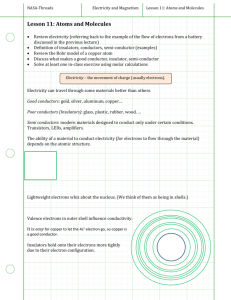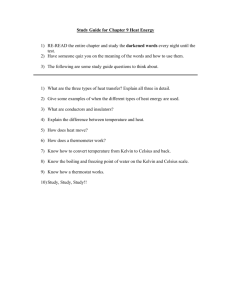File
advertisement
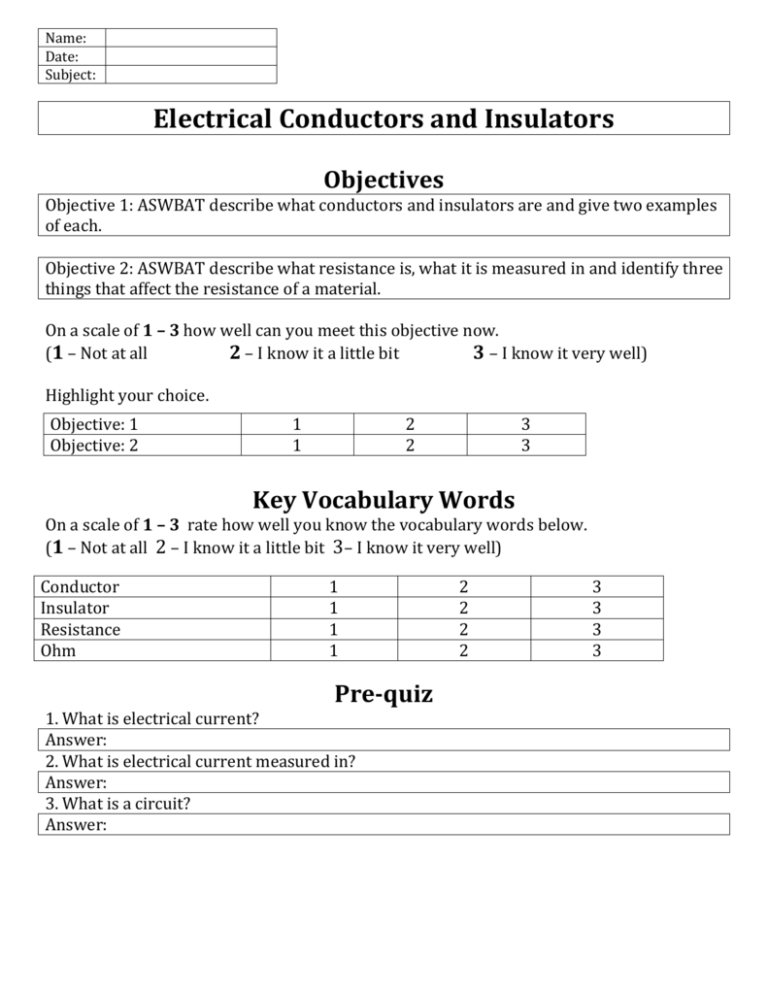
Name: Date: Subject: Electrical Conductors and Insulators Objectives Objective 1: ASWBAT describe what conductors and insulators are and give two examples of each. Objective 2: ASWBAT describe what resistance is, what it is measured in and identify three things that affect the resistance of a material. On a scale of 1 – 3 how well can you meet this objective now. (1 – Not at all 2 – I know it a little bit 3 – I know it very well) Highlight your choice. Objective: 1 Objective: 2 1 1 2 2 3 3 Key Vocabulary Words On a scale of 1 – 3 rate how well you know the vocabulary words below. (1 – Not at all 2 – I know it a little bit 3– I know it very well) Conductor Insulator Resistance Ohm 1 1 1 1 Pre-quiz 1. What is electrical current? Answer: 2. What is electrical current measured in? Answer: 3. What is a circuit? Answer: 2 2 2 2 3 3 3 3 Conductors A material is considered to be a conductor if it “conducts” the electric current or flow of electrons fairly easily. Most metals are considered to be good conductors of electrical current. Copper is one of the more popular materials that is used for conductors. Other materials that are sometimes used as conductors are silver, gold, and aluminum. Gold and silver are very good conductors. Copper is still the most popular material used for wires because it is a very good conductor of electrical current and it is fairly inexpensive when compared to gold and silver. Aluminum and most other metals do not conduct electricity quite as good as copper. Water is also a good conductor, this is why you don’t want to use plugged in electronics when you are in the bathtub and it’s why you don’t go swimming during a lightning storm! Copper Wires 1. What is a conductor? Answer: 2. Give two examples of good conductors. Answer: Insulators Insulators are materials that have just the opposite effect on the flow of electrons. They do not let electrons flow very easily from one atom to another. Insulators are materials whose atoms have tightly bound electrons. These electrons are not free to roam around and be shared by neighboring atoms. Some common insulator materials are glass, plastic, rubber, air, and wood. 1. What is an insulator? Answer: 2. Give two examples of good insulators. Answer: How do we use insulators? Insulators are used to protect us from the dangerous effects of electricity flowing through conductors. Sometimes the voltage in an electrical circuit can be quite high and dangerous. If the voltage is high enough, electric current can be made to flow through even materials that are generally not considered to be good conductors. Our bodies will conduct electricity and you may have experienced this when you received an electrical shock. Generally, electricity flowing through the body is not pleasant and can cause injuries. Therefore, we need to shield our bodies from the conductors that carry electricity. The rubbery coating on wires is an insulating material that shields us from the conductor inside. Insulator Power Lines Action! – Let’s go look at some power lines. 1. Why are insulators important? Answer: 2. What could happen if a wire loses its insulating rubber coating? Answer: Resistance Resistance is a term that describes the forces that oppose the flow of electric current in a conductor. All materials naturally contain some resistance to the flow of electric current. We have not found a way to make conductors that do not have some resistance. If we use our water analogy to help picture resistance, think of a hose that is partially plugged with sand. The sand will slow the flow of water in the hose. We can say that the plugged hose has more resistance to water flow than does an unplugged hose. If we want to get more water out of the hose, we would need to turn up the water pressure at the hydrant. The same is true with electricity. Materials with low resistance let electricity flow easily. Materials with higher resistance require more voltage (power) to make the electricity flow. Resistance is measured in Ohms. We will learn more about this later. Resistance 1. What is resistance? Answer: 2. What is resistance measured in? Answer: How do we use resistance? Resistance can be both good and bad. If we are trying to transmit electricity from one place to another through a conductor, resistance is undesirable in the conductor. Resistance causes some of the electrical energy to turn into heat so some electrical energy is lost along the way. However, it is resistance that allows us to use electricity for heat and light. The heat that is generated from electric heaters or the light that we get from light bulbs is due to resistance. In a light bulb, the electricity flowing through the filament, or the tiny wires inside the bulb, cause them to glow white-hot. If all the oxygen were not removed from inside the bulb, the wires would burn up. Electric Iron 1. Name two things that we use resistance for. Answer: Incandescent Light Bulb Factors That Affect Resistance Not all materials resist electricity equally. There are three factors that affect the resistance that a material can have. 1. The length of material affects resistance. Longer wires create more resistance then shorter wires. 2. The thickness of a material affects resistance. Thinner wires have more resistance then thicker ones. 3. What the material is made of affects resistance. Conductors create less resistance then insulators. 1. What are three factors that affect resistance? 2. Do longer or shorter wires have more resistance? Answer: 3. Do thicker or thinner wires have more resistance? Answer: 4. Which types of materials have more resistance, conductors or insulators? Answer: Action! – Let’s test objects to see if they are made of conductors or insulators using a simple circuit. Material Copper Wire Nail Binder Clip Ribbon Plastic Pen Wood Clothes Pin Quarter Penny Dime Cork Bottle Cap Glass Bottle Plastic Fork Key Ring Conductor or Insulator? Quiz Directions: Answer the following questions to see if you met the objectives. 1. What is a conductor? Answer: 2. Give two examples of good conductors. Answer: 3. What is an insulator? Answer: 4. Give two examples of good insulators. Answer: 5. Why are insulators important? Answer: 6. What could happen if a wire loses its insulating rubber coating? Answer: 7. What is resistance? Answer: 8. What is resistance measured in? Answer: 9. Name two things that we use resistance for. Answer: 10. What are three factors that affect resistance? 11. Do longer or shorter wires have more resistance? Answer: 12. Do thicker or thinner wires have more resistance? Answer: 13. Which types of materials have more resistance, conductors or insulators? Answer:
